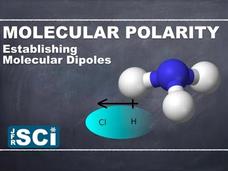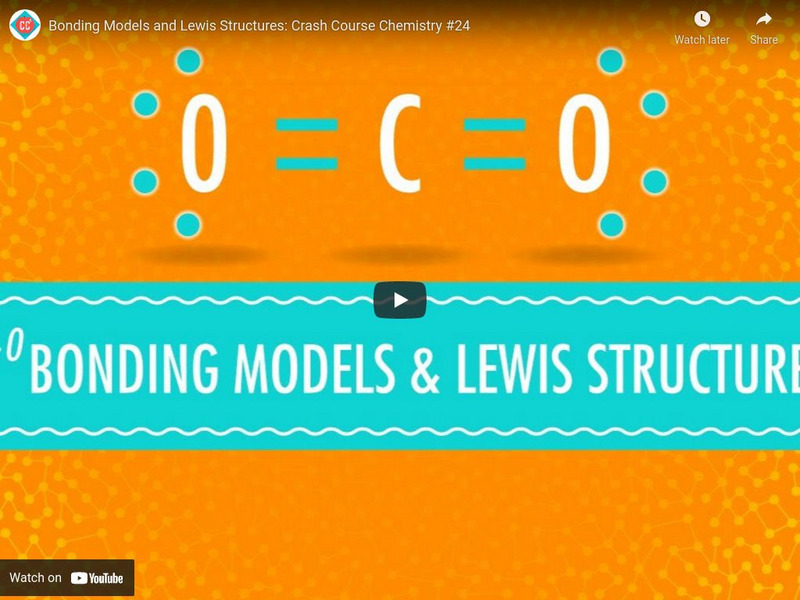Curated Video
Learn How To Draw Lewis Structures Easily: 4 Simple Steps For Perfect Chemistry Diagrams Every Time
Never draw a Lewis Structure wrong again! In this video, we’ll show you 4 simple steps to master the art of drawing Lewis Structures—an essential skill in chemistry that helps explain molecular behavior and the chemical and physical...
Brainwaves Video Anthology
Gratitude to Susan: A Mentor's Impact on Leadership Development
Cynthia Owyoung is vice president of inclusion, equity, and belonging at Robinhood, where she drives the company’s approach to enhancing its culture of diversity and inclusion. In this video, Cynthia deep gratitude to Susan Burnett, a...
Curated Video
VSEPR Theory: Learn Molecular Geometry Fast - Chemistry Study Guide
Struggling with VSEPR theory and molecular geometry? This video simplifies the concepts you need to master these essential chemistry topics. Learn how to draw Lewis structures with the correct geometry, understand bond angles, and...
Brainwaves Video Anthology
The Brainwaves - Tomorrow's History Today - The 200th Video
This is my 200th video in the Brainwaves Video Anthology. It features 10 thought-leaders from my second year of filming. Watch Thomas L. Friedman, Linda Darling-Hammond, Walter Mischel, Carol Dweck, James P. Comer, Deborah Meier, Sugata...
Professor Dave Explains
Practice Problem: VSEPR Theory and Molecular Geometry
What's with all these shapes? Let's practice assigning hybridization, electron-domain geometry, and molecular geometry. Octahedral! Tetrahedral! Linear! Pyramids and see-saws and what not! Chemistry is fun, isn't it?
Science360
Fructose molecular structure - Sweet Side of Chemistry
Fructose, or fruit sugar, is found in tree fruits, honey and berries, though you may know it from its corn-based origins as the common ingredient high-fructose corn syrup. NSF-funded researchers are also looking at plant sugars as a...
GPB Television
Chemistry 502: The World of Atoms is Not Enough – Bonding Part II
"The name is Bond. James Bond." Or is that "Chemical Bond?" Assign the viewing of the video as homework, and then have your chemists come to class to practice drawing electron dot diagrams and Lewis structures with the several bonus...
JFR Science
Molecular Polarity
Polar or non-polar, that is the question. Individuals watch a video in the JFR Science playlist to learn about molecular polarity. Using three-dimensional Lewis structures and electronegativity lets them determine polarity of a molecule.
Berkeley University of California
Molecular Structure and Geometry
While physics is known for the math connections, chemistry is know for geometric connections. The 11th video in the series discusses how to determine the molecular structure of bonded atoms in a 3-D plane using steric numbers.
Educreations
Lewis Dot Structures
What may look like a bunch of dots is actually complex science! Gilbert Lewis' work is important for understanding molecular chemistry, and his approach is great for visual learners. The video describes the process of drawing a Lewis dot...
Berkeley University of California
Oxidation Bond Angle (NB)
What is the show Caesium and Iodine love watching together? CsI. The first video explains how to determine the bond angle of an oxidation. The second focuses on how to determine which are linear ions by using molecular geometry.
Berkeley University of California
Isomers
Why did the two dipoles start going out? Because they had a moment. The video briefly explains isomers and the difference between structural isomers and stereo isomers before diving into the importance of defining dipole...
JFR Science
Covalent Bonds: Why Can't We Have a Molecule of Salt?
Sharing just makes you feel good ... especially if you're a non-metal! Young chemists examine bonding basics with a video from JFR Science. Topics include how covalent bonding differs from ionic bonding, how covalent bonding works, and...
Socratica
Chemistry: What Is an Ionic Bond?
Teach your class all they want to know about ionic bonds. An engaging video, part of the Socratica "Chemistry Lessons" playlist, explains what ionic bonds are and how they form. It describes multiple examples of ionic bonds and...
Socratica
Chemistry: What Is a Covalent Bond? (Polar and Nonpolar)
When it comes to covalent bonding, sharing is caring! As part of the Socratica chemistry playlist, a useful video explains the definition of covalent bonding. Then, it works through examples of single bonding, double bonding, polar...
Crash Course
Crash Course Chemistry #24: Bonding Models and Lewis Structures
In this crash course, explore why scientists develop scientific models like Lewis Structures, and how people can learn from them.
Other
Youtube: Vsepr Theory Practice Problems
Learn how to take a Lewis structure and determine what the 3D shape the molecule will be using the VSEPR theory. [14:24]
Tyler DeWitt, PhD
Science With Tyler De Witt: Vsepr Theory Part 2: Trigonal Bipyramidal Family
In this tutorial, take a look at diagrams of the VSEPR shapes, and examine bond angles for each structure. [15:06]
Tyler DeWitt, PhD
Science With Tyler De Witt: Vsepr Theory: Common Mistakes
Understand how to determine the shape or geometry of a molecule using the VSEPR rules, for valence shell electron pair repulsion.
Tyler DeWitt, PhD
Science With Tyler De Witt: Vsepr Theory: Introduction
This is an introduction to the basics of VSEPR Theory. In this video, learn about the following shapes: linear, trigonal planar, bent, tetrahedral, and trigonal bipyramidal.
Sophia Learning
Sophia: Vsepr: Bent Molecules: Lesson 2
This lesson will explore bent shaped molecules including bond angles. It is 2 of 2 in the series titled "VSEPR: Bent Molecules."















